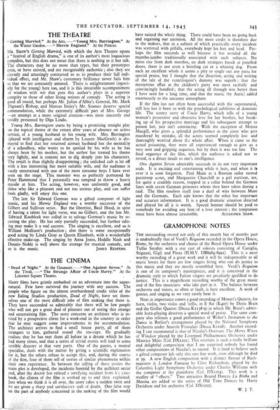THE THEATRE
Getting Married." At the Arts.—" Young Mrs. Barrington." At the Winter Garden.—" Merrie England." At the Princes.
MR. Skuivies Getting Married, with which the Arts Theatre opens a "festival of English drama," is one of its author's most loquacious comedies, but this does not mean that there is nothing to it but talk. The characters may be no more than types, but their prototypes exist, or have existed, and are recognisably authentic - also they are cleverly and amusingly contrasted so as to produce their full indi- vidual effect, and Mr. Shaw's customary brilliance never fails him so that we are constantly amused. There is enlightenment (especi- ally for the young) here too, and it is this invariable accompaniment of wisdom with wit that puts this author's plays in a superior categtCry to those of other living writers of comedy. The acting is good all round, but perhaps Mr. Julian d'Albie's General, Mr. Mark Dignam's Bishop, and Marcus Insley's Mr. Soames deserve special commendation, while the extremely difficult 'part of Mrs. George —an attempt at a more original creation—was most sincerely and vividly presented by Olga Lindo.
Young Mrs. Barrington starts by being a promising straight play on the topical theme of the return after years of absence on active service, of a young husband to his young wife. Mrs. Barrington (played with intelligence and charm by Leueen 1ViacGrath) is dis- mayed to find that her returned airman husband has the mentality of a schoolboy, who wants to be spoiled by his wife as he has always been by his mother, but the author has treated his theme very lightly, and is content not to dig deeply into his characters. The result is thus slightly disappointing ; the unlicked cub is let off with a less interesting but more suitable wife, and the audience is vastly entertained with one of the most tiresome boys I have ever seen on the stage. This monster was so perfectly portrayed by Peter Hammond that I personally was tempted to throw a heavy missile at him. The acting, however, was uniformly good, and th6se who like a pleasant and not too serious play, and can suffer fools gladly, will enjoy this one.
The late Sir Edward German was a gifted composer of light music, and his Merrie England was a worthy successor of the Gilbert and Sullivan series. But the librettist, Basil Hood, in spite of having a talent for light verse, was no Gilbert, and the late Mr. Edward Knoblock was called in to salvage German's music by re- casting the play. He has only partially succeeded, but further edit- ing may make it a real success. The singing is excellent, and so is William Mollison's production ; also there is some exceptionally good acting by Linda Gray as Queen Elizabeth, with a wonderfully effective make-up. The singing by Anna Jeans, Heddle Nash and Dennis-Noble is well above the average for musical comedy, and


























 Previous page
Previous page